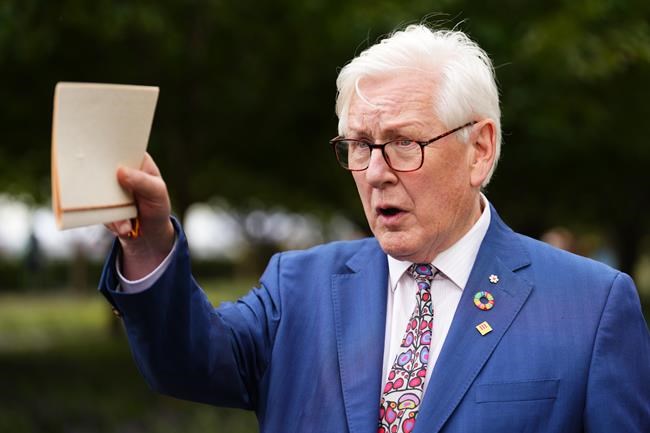Bob Rae hopeful for UN development goals, despite ‘intractable issues’ worldwide
By Dylan Robertson, The Canadian Press on January 3, 2025.
 Permanent Representative of Canada to the United Nations Bob Rae speaks to reporters at UN headquarters, Monday, Sept. 23, 2024. THE CANADIAN PRESS/Sean Kilpatrick
Permanent Representative of Canada to the United Nations Bob Rae speaks to reporters at UN headquarters, Monday, Sept. 23, 2024. THE CANADIAN PRESS/Sean KilpatrickOTTAWA – Canada is trying to push the world’s nations to stick with the goals they set to confront the planet’s main challenges, despite rising geopolitical confrontation that has made the 2030 deadlines more difficult to meet.
“There are any number of reasons why you could say this is impossible, but you can’t let yourself give in to those,” said Bob Rae, Canada’s ambassador to the United Nations.
Last summer, he started a one-year term leading the UN Economic and Social Council, a body that manages the UN’s most prominent agencies and the bulk of its budget.
The council, dubbed ECOSOC, was started at the founding of the UN to co-ordinate the work of its agencies including refugee support, pandemic response and global rules on civil aviation and postal services.
In recent years, the council has tried to help countries meet the Sustainable Development Goals, a series of targets the world agreed to try achieving by 2030 to get humanity on track to end extreme poverty, achieve carbon-reduction targets and wipe out the worst preventable diseases.
The UN says those goals are “severely off track” with a rise in recent years of greenhouse gas emissions, extreme poverty and hunger. The UN is trying to reform itself to be more effective and give more of a voice to developing nations, but has seen stymied by geopolitical shifts.
The entire global system is also bracing for pushback from U.S. president-elect Donald Trump, whose policies could also cause widespread economic disruption.
Rae admits the UN faces “intractable issues,” with the largest number of active conflicts since its founding, the highest-ever amount of displaced people, and continuing economic impact from COVID-19.
“It’s an enormous challenge to bring it together (and) refocus it,” Rae said of the UN.
Yet he sees plenty of reason for hope: before the COVID-19 pandemic, the world had made decades of progress toward eradicating diseases through vaccines and curbing extreme hunger and maternal deaths through technology.
“It’s precisely because everyone’s becoming so much more knowledgeable and articulate about what the challenges are that we forget how bad they were before,” he said.
“That, I think, is what increases the sense of how tough it is, but we shouldn’t get overwhelmed by that.”
Rae said the world couldn’t have moved past COVID-19 without the global systems to collaborate on creating and sharing vaccines and public-health measures.
The world’s progress includes work led by countries often at odds with Canada.
“The two great significant moves in moving and improving the poverty numbers around the world have been the success of China and India in fostering economic development,” Rae said.
“The multipolarity of these shifts is very clear. But we still have this overall goal and we need to be talking to each other.”
He was encouraged by African states rebuffing an attempt by Russia last September to derail a vote aimed at reforming the UN during a high-profile summit, on the grounds the reform was biased toward Western countries. He believes it shows an interest in progress over what he has called geopolitical “histrionics.”
To him, the Sustainable Development Goals encapsulate “the common sense of mankind” and require governments to track progress and avoid duplicating their efforts.
He said the UN could tap into artificial intelligence to better track progress and crack down on corruption, such as by enhancing monitoring for illicit financial transactions.
Canada could also step up its progress on the goals by incorporating them into federal, provincial and municipal budgets, he said. Ottawa occasionally reports progress and has the auditor general assess compliance with these global goals.
Rae added that real progress is impossible without full the participation of women and girls in education and job opportunities.
He started his job as Canada’s main ambassador at the UN shortly after the country failed to win a seat on the Security Council, and he said Ottawa eyed the ECOSOC presidency as one way for Canada to still be relevant at the UN, a body where it historically has had outsized influence.
“Canada has always played a very strong role on the policy side of these questions, as well as on insisting on greater co-ordination and more efficiency,” he said.
Most of Rae’s role as head of the Economic and Social Council will happen starting in February, when the council undergoes an intense cycle of meetings on the function of agencies like the World Health Organization, UNICEF and the UN Refugee Agency.
“There are very few press releases or drama about this, except that it’s the ongoing life of the world.”
He finishes in July, and says success would mean UN states seeing reform as something to be done on an ongoing basis and by working together, instead of letting problems fester.
He also argued that a focus on military defence over development will only increase the factors that lead to wars.
“We can’t see things in silos and stovepipes,” he said.
“If we abandon our commitments to international development, that will deepen the security crisis around the world, I guarantee it.”
This report by The Canadian Press was first published Jan. 3, 2025.
31-30


